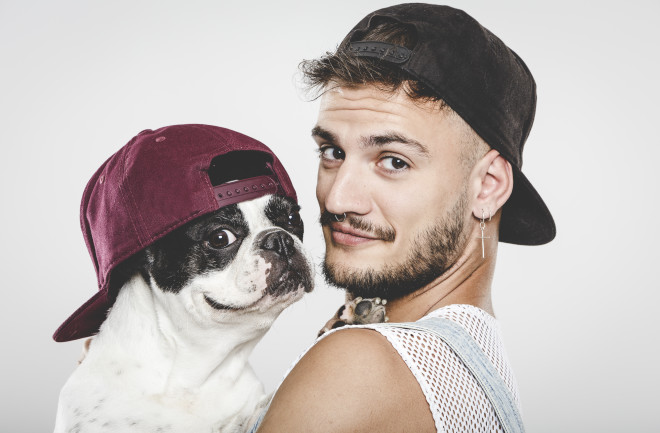This article was originally published on June 21, 2023.
Whether you’re at the dog park or just taking a stroll around the block, you’ve surely seen this before: A pup who looks — almost uncannily — like a miniature version of the human holding its leash.
Maybe it’s the muscular pit bull who resembles its similarly-buff owner. Or the prim-and-proper poodle whose coiffed fur is a perfect match for its human's stylish hairdo. You may have even suppressed a chuckle at the basset hound whose mellow demeanor mirrors that of its droopy-eyed handler's.
So why do so many dogs appear to be tiny, hairier versions of their owners? Perhaps surprisingly, the conundrum has been well studied by scientists. In fact, there’s a decent body of research supporting the notion that humans choose canine companions who look most similar to themselves.
Science Confirms That Dogs Look Like Their Owners
Over the years, multiple studies have put the idea to the test. For example, in a study published in the journal Anthrozoös in 1999, a group of 261 women were instructed to pick which breed of dog they preferred out of a small selection of breeds: either lop-eared pooches, like beagles, or those with pricked ears, such as Siberian huskies.
Read More: Why Do Dogs Tilt Their Heads to One Side?
Fittingly, the women with longer hair preferred the lop-eared pups, while women with shorter hair selected those with pricked ears.
Several years later, in a study published in Psychological Science in 2004, researchers at the University of California, San Diego photographed dogs and their owners separately at three local dog parks — and then tasked a group of participants with matching them.
Even with no additional context, the “judges” were able to pair the pooches and their people with a fair degree of accuracy. (So long as the dog in question was a purebred.) What’s more, the ability to match them correctly didn’t depend on any single trait in common, like overall size or hairiness.
“The results suggest that when people pick a pet, they seek one that, at some level, resembles them,” the study authors write.
Why Do People Look Like Their Dogs?
Some researchers think people might pick dogs that look like them because, simply put, we tend to like things that are familiar — a psychological phenomenon known as the mere-exposure effect. Since we’re well acquainted with our own faces from a lifetime of looking in the mirror, it makes sense that we’d pick pooches who evoke that same comforting sense of familiarity.
Other psychologists, meanwhile, chalk it up as a consequence of the way that humans evolved to find mates: Dating someone who looks like us can be a way to ensure that our genes are genetically compatible and increase the likelihood of passing them on. (In the scientific literature, this is known as assortative mating or “self seeking like.”) Indeed, some studies have shown that romantic partners have a higher degree of facial similarity than random pairings.
Read More: Dogs Shed Tears Of Joy When Reunited With Owners
Whatever the reason, we don’t just choose pets and partners who look like us — we may even prefer inanimate objects that resembles ourselves, including cars. (Yes, really.) In a study published in the Swiss Journal of Psychology in 2014, scientists found that the front of cars often look like their owners’ faces. And, of course, the cars of the participants tended to resemble their dogs, too.
Do Dogs Act Like Their Owners?
If this all makes it sound like humans are shallow narcissists, take comfort: Our penchant for the familiar isn’t just surface level. Despite the conventional wisdom that opposites attract, studies have shown that people tend to pick their partners based on shared personality traits.
This applies to our canine companions, as well. Borbála Turcsán, an animal behavior researcher at Eötvös Loránd University in Hungary, and her colleagues found that dogs’ personality profiles tend to mirror their owners in a 2012 study. For example, more extroverted owners had dogs that would also express extroverted traits — like spending more time looking at a stranger during a new interaction.
“In all cases, the [personality] correlation between them was significantly different from random chance,” she says. “And the magnitude of correlation was higher than what was found in human-human relationships. […] So our expectations from the relationships with our dogs could be similar to what we expect from our other human relationships.”
Turcsán also notes that the correlation between the pair wasn’t a reflection of how long the dog had been living with their owner, meaning that they weren’t engaging in simple mimicry. Rather, the pup’s personality seemed to be part of what attracted its owner to begin with.
Perhaps it shouldn’t come as much of a surprise that we’re so drawn to dogs who look — and act — like us. After all, in the United States, the average dog’s life span does outstrip the length of the average marriage.
Read More: How Dogs Perceive Time




